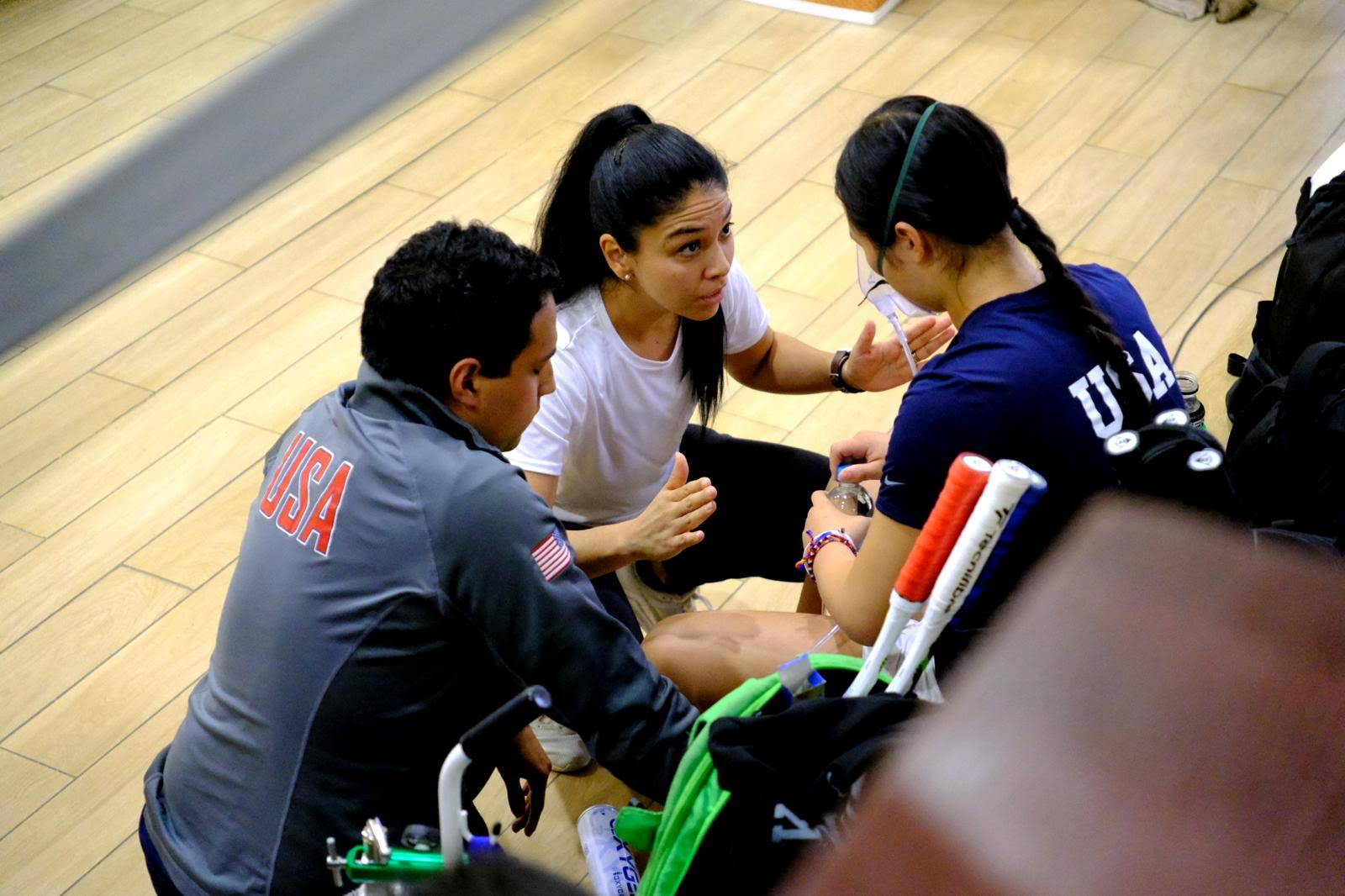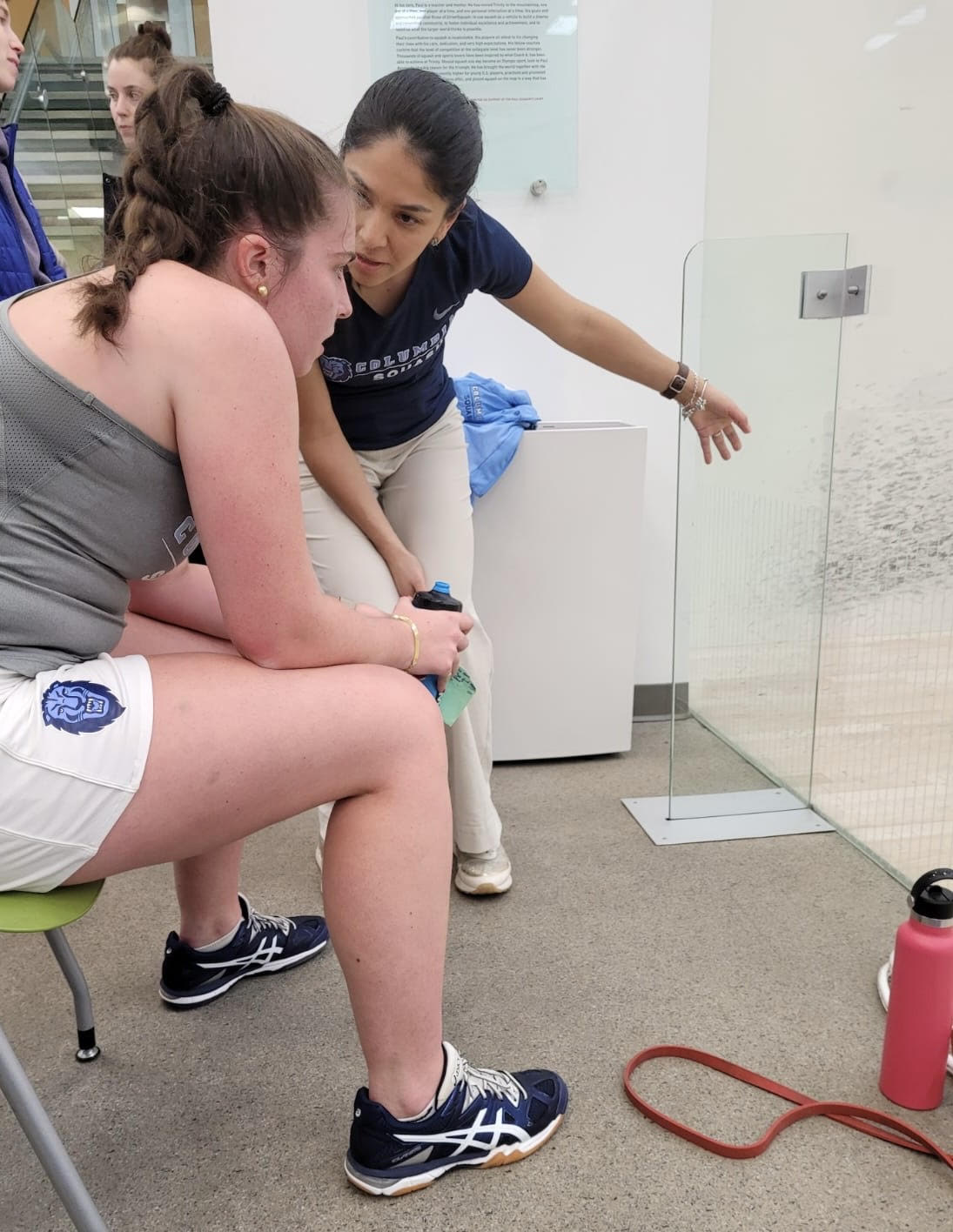I strongly believe that if you were to talk to any squash player and ask them about their experiences, they would all appreciate the realm of opportunities that squash offers. Being a squash player means experiencing so many special things, such as traveling to unique places for tournaments, meeting new friends from around the world, and discovering your own potential.
For Coach Nayelly Hernandez-Walker, current assistant coach for the Columbia men’s and women’s squash teams, squash has enabled her to experience success and pride as both a player and mentor.
Coach Nayelly’s journey with squash began in Mexico with her father. After health issues of his own, Coach Nayelly’s father encouraged her and her siblings to exercise and stay active. What started as a fun activity for Coach Nayelly soon transformed into a competitive career. She quickly fell in love with the feelings of validation and accomplishment from both small and big wins. She said that some of the most rewarding aspects of squash are “winning a long rally after you’re so tired,” and also, “seeing improvements in your game in general after putting in time and effort.”

2016 World Team Championship Event playing for Team Mexico
To further help her achieve her ambitions, the Mexican government financially supported Coach Nayelly. She remembers how she had to “stay in the top three or four at the national level, whether it was Juniors or Seniors, in order to keep getting the support to play tournaments or get certain training.” Despite the pressure to maintain her performance, Coach Nayelly remained motivated and determined by the possibilities of traveling and competing on a larger scale. In our interview, she said, “When I was younger, I couldn’t dream of even just getting outside the city, competing for my state, and going to play all the kids from other parts of the country. And then playing the US and Canadian Junior Opens were big, but I knew that I had to maintain a certain level and ranking to keep going. Embracing that challenge and turning it into motivation was good.”
Coach Nayelly’s hard work and perseverance paid off when she became the first Mexican female recruited to play college squash. After three seasons on Trinity College’s women’s team, Coach Nayelly continued playing on the professional circuit. One highlight for her was at the 2011 Pan American Games in Mexico. Coach Nayelly remarked that the home crowd and her family’s support made winning Gold with Samantha Terán during the doubles event especially memorable for her.

2011 Pan American Games, Doubles Gold Medallist with Samantha Teran
Between 2015-2016, Coach Nayelly transitioned from her professional career into coaching. After representing Team Mexico in the Pan American Games and World Individual and Team Championships on multiple occasions, Coach Nayelly began coaching with Natalie Grainger at Chelsea Piers in Connecticut.
Serving as an inspiring role model to younger generations is extremely important to Coach Nayelly, making coaching a natural skill and talent of hers. She reflected on how one of her favorite parts of being a coach is “just seeing my players’ faces with that sense of accomplishment, whether they achieved something technical or a greater sense of improvement.” Coach Nayelly also talked about the gratifying nature of supporting her players as they learn greater life skills and lessons through squash: “I think of sports in general as connected to life and all the values that we get through squash. Accompanying somebody while they’re learning things like believing in yourself, staying disciplined, managing pressure, handling disappointment, and staying patient is one of the most rewarding things that I’ve done.”

Coach Nayelly, coaching for Team USA
I asked Coach Nayelly what she thought was something most people don’t understand or underestimate about coaching. She said that most people don’t consider the true extent of time and effort coaches exert: “We get on court and give a lesson, but it’s not just that. It takes so much more. You’re developing little humans…It’s the planning and off-court parts too.” I’ve done my fair share of lessons and clinics with a variety of different coaches. It’s definitely easy to simply recognize the on-court time with coaches, but Coach Nayelly gave me a renewed sense of gratitude for all the extra thought and effort coaches put into helping their students grow, improve, and achieve their goals.
Having played as a junior and professional squash player, and now coaching, Coach Nayelly offered lots of great advice to women and girls involved in the sport. She advises female players just starting off to “enjoy the process because everything worthwhile takes time. It’s really about having fun doing the right thing and developing that passion for what you’re doing.” I completely agree with Coach Nayelly. From playing squash myself for almost ten years and watching my two younger sisters play, I truly believe that players’ own passion and love for the game directly translates into their level of energy, grit, and determination in their games.
 Coach Nayelly strategizing with one of her Columbia Squash athletes
Coach Nayelly strategizing with one of her Columbia Squash athletes
To add on to her many achievements on the court, Coach Nayelly also has a Master’s degree in Sports Psychology and works as a mental coach. Her biggest pieces of advice in terms of the mental side of the game are to “1. Pause for a moment and get back to the here and now (staying present); 2. “Look back to see and remember all the great things you have done and how much you have grown (compared to yourself); 3. Look forward to the future by creating an action plan; and 4. Enjoy the process!” She stresses the importance of practicing mental skills often, just as you train muscles in the gym.
Coach Nayelly’s wisdom led me to think about how reflecting on the past, present, and future is key to a sustainable and enjoyable career as a squash player. Acknowledging and celebrating personal accomplishments, growth, current circumstances, and future goals helps players develop their own internal confidence and positive mindset. Coach Nayelly’s journey was filled with testing moments, empowering successes, and now, the opportunity to be an inspiring role model and share her wisdom and brightness to all those around her.


Comments
Post a Comment